
Venezuelan President Nicolás Maduro spoke at the National Black Theatre in Harlem on Monday while he was visiting New York for the United Nations General Assembly. Joining him at the event were actor and activist Danny Glover, New York state Sen. Bill Perkins, and #BlackLivesMatter organizer Opal Tometi.
Transcript
PRESIDENT NICOLÁS MADURO: [translated] Good evening, everyone, dear brothers and sisters. I’d like to thank all of the organizers for this moment that life has gifted us and Harlem has gifted us. Harlem is a legend in the world, in the struggle for justice and equality, in the struggle of people. We are very happy to be here in the National Theatre of Harlem and to share all of your spirituality and heritage and all of your memories that are alive. Malcolm X was here, and Malcolm X is present here tonight with us, with all of his banners. Fidel Castro was here in Harlem, too, and he is alive and well and with us tonight. So, greetings to all the organizers. Bill Perkins, the state senator for New York, is here; Opal Tometi, the founder of Black Lives Matter; Yvette Modestin, a poet and founder of the diaspora conference [Encuentro Diaspora Afro] from Boston; and Ms. Vazquez from the international health workers union 1199 [SEIU]; and Esmeralda Brown, writer, poet and activist, who is the head of the center of the Caribbean diaspora [Southern Diaspora Research and Development Center]. And another brother and the musical group that played for us earlier—I can play some drums with you guys if you’d like—thank you for your marimbas and drums. The pastor from Brooklyn—and a shout out to the peeps in Brooklyn and the Bronx. And the president of the Black National Theatre. Greetings to all, Esmeralda, Opal and Yvette, and to our dear brother, who’s always smiley and always welcomes us with an embrace, even when things are really rough, but he’s always cheerful, Danny Glover. Warm greeting from our commander, Hugo Chávez, and our people to each and every one of you. José López, who is a Mandela of the Americas, and also Carlos López Rivera, big hug to you, my brother. So, the house is full of strugglers, of heroes and heroines, in the house.
This event has a very special spirituality, because the struggle for human rights and the ancestral rights of the Afro-American peoples is a struggle that is particularly relevant in the recent years and months. From South America, believe me, brothers and sisters of the United States, we suffer with you. We suffer and feel Ferguson. It hurt us. It hurt us to see that the old scaffolding of racism is still intact and is like a ghost that is haunting our peoples, racism that is just the son of slavery, the direct descendant of slavery and the regime of slavery and segregation and exploitation, the most brutal form of exploitation, these brutal regimes that have ruled in these lands for hundreds of years, rooted in a supposedly civilized or supercivilized Europe, which came to America and imposed colonialism and exterminated more than 80 million indigenous brothers and sisters who lived from Alaska to Patagonia.
The first holocaust of these lands is the indigenous holocaust that our grandfathers and grandmothers suffered. And we are their descendants, were the Carib people. And the Carib people resisted for over a hundred years. And the name of our people still is renown. And Cilia, my wife, is one of the strugglers of the Carib people. And Guaicaipuro and Túpac Katari and Túpac Amaru are historic strugglers who, despite being quartered and massacred and murdered in the 16th and 17th centuries, their names, their spirit of struggle and their legacy of struggle transcended their death and still guides us. So I asked an eight-year-old, “Why is it a name of a man or a woman who died for the struggle hundreds of years ago can still be so relevant?” And the little boy said, “Wow!” And I said, “Well, the Fox News and the official history of the time wanted to render these heroes and heroines invisible and to silence their legacy, but nonetheless their example and the purity of their spirit and the strength of their struggle transcends. And this is a gift of our grandmothers and grandfathers to us.”
And if something was missing from the formula of this first indigenous holocaust—when our commander, Hugo Chávez, spoke about the indigenous holocaust, people would say, “How much longer are you going to go on about this indigenous holocaust?” He would answer, “Forever, because this is a crime against humanity, and we need a consciousness rooted in these truths and knowledge so that we can destroy the paradigms that impose colonialism and new empires.” We need to generate a new raison d’être for humanity, for human beings, as brothers and sisters, based on fraternity. So, like I was saying, if something was missing from the formula for this perfect indigenous holocaust, these people who were forcibly relocated from their lands and evicted and massacred and converted into peons and slaves, some people calculate that as many as 100 million Africans were brought to this country, and their descendants proudly inhabit these lands. We are the children of this indigenous holocaust and of these enslaved Africans and the mothers who played the drums and were joyous regardless of these tribulations, and who schooled us in their joy and music and drums. We commemorate these heroines and heroes and the example of resistance that they gift us, an example for the Americas and the Caribbean. One of the most important things that is happening now with social movements is the renovation and renewal of our social movements in Latin America.
So I want to also extend to you a very warm greeting from the Venezuelan people and our revolutionary government to the people of New York and to the people of Harlem and our brother people of the United States. There’s a lot of issues that we’ve been working on. We recently had a meeting, a private meeting, with a group of union leaders of health and transportation sectors. We had a conversation, and we learned a great deal from them. We are always willing to sit down and listen and learn. Presidents shouldn’t always hang out with the elite or in palaces or VIP events. If we could choose, we would rather be in Harlem and Brooklyn and Bronx and Boston. If we could choose—I’m telling you the truth here—we would prefer to go and hear the heart of the men and the women who are in the streets, so that we can learn about the collective consciousness, which is what’s most important in this life. And our hope is that humanity can tap into this collective consciousness to guide our way forward. Hugo Chávez loved to paraphrase a poet and singer. He was fond of singing, our commander. He would say, “How can we make sure that humanity stays humane, so that humanity actually merits its name, humane-ity, humanity? Stay human, humanity.” So, these are distinguished struggles, Mr. Senator.
So, who said that life is a walk in the park? Our people suffer so much. If we take a look at what the 20th century and 21st century has brought on Latin America, we see so much suffering and war and civil wars in this world. But we believe, and we have faith, absolute faith. Like Commander Chávez would say, we have a faith that is giant like the blood moon of last night. We have a giant faith in the future. We have absolute faith. And we struggle with this faith and for this faith, because of the struggle of all of the different currents and groups against racism and social exclusion and neoliberalism, and against sexual discrimination, and the struggles of all of our movements for the right to work, for social security and for free public high-quality education. We want all of our movements to find the path in common to build a new power for this world that represents the collective consciousness of humanity. Everyone is finding their path. And we have found our path, a path that has been blocked by betrayal, by betrayal and lies. But our path is the historic path of the liberators of our continent, and it’s the path that springs from our ancestral root, and it’s the path that our commander, Hugo Chávez, traveled. And I commemorate him here in Harlem for having traveled that path.
I was talking with the unionists about something that a whole lot of people don’t know about. We shared on Saturday—Friday, Saturday and Sunday in the United Nations in New York, that has been celebrating this summit for the post-2015 agenda. And the Pope Francisco inaugurated the summit with an extraordinary speech. And yesterday he was out in the streets of New York greeting the people of New York with his sincere and honest style. So this world summit on the post-2015 development agenda adopted something very important for the countries of the world in the next 15 years, from 2015 to 2030. After intense negotiations between governments and comparing different visions for the world, we drew up a plan of action for equality and life, and against poverty of the United Nations for the next 15 years. It’s actually quite a remarkable feat.
So, all of that was achieved based on the experience of the so-called Millennium Development Goals, which was maybe the first social experiment in the U.N. system, that went from 2010 to 2015, and Commander Hugo Chávez and Fidel Castro were instrumental in the adoption of the Millennium Development Goals, that were comprised of eight goals, that committed governments of the world to be accountable to the U.N. and apply to all the achievement of these goals on health and education and other matters. And so, this special summit was convened by the U.N. secretary-general, Ban Ki-moon. And here I have some documents which I think are very important, and I think it’s very important that our social movements, in their struggles for life and against racism and discrimination and exploitation, are well aware of this historic decision of the U.N. that was taken yesterday. And we need to see how our struggles can, at the local level and by sector and regional level, internationally, can dovetail with this new post-2015 development agenda for humanity’s social, political, economic and spiritual development.
So, 17 goals were adopted, and 169 targets were adopted. And I think that the fundamental thing is that—of course, new elements will probably be incorporated, but the fundamental thing is that they reflect the aspirations of our peoples. I state that the Bolivarian revolution, which I preside, and our popular revolution, which is an anti-imperialist, pro-Chávez revolution in the 21st century and a socialist revolution, takes up the implementation of these 17 development goals, and we’re going to include them in our peoples’ plan for our nation. And I believe, brothers and sisters, that fulfilling this post-2015 development agenda requires a new political and economic model that is committed with the peoples, and we need to break the monopoly on the wealth, because the wealth belongs to everybody.
So, maybe it’s a little detail, but we need to build economic models that put people before profits and capital and that substitute the super-elites of the world that expropriate the wealth of so many people. There’s so much pain going on. We see it on TeleSUR. I don’t know if you watch TeleSUR, but they are broadcasting in English these days. It saddens us to see that—for example, what’s happening in Spain, how people are getting evicted from their apartments, entire Spanish families, because of the economic situation of the banks, because the family hasn’t been able to pay the exploitive interest rates, and what is important is the right of the banks, the right of capital, rather than the right of people to housing. We need economic models that prioritize human beings and their work, as Yvette was saying and as Opal said, when he denounced the neoliberal racism and the neoliberal model as the basis of racism and of social exclusion.
So each people contributes to the debate, but as president of the republic, of our Venezuelan country, nation, I am happy to share with the unions and social strugglers that we are organizing a great summit of the peoples to organize so that we can achieve these 17 objectives of the post-2015 development agenda. So we are going to convene a great peoples’ summit with leaders who love their peoples, with leaders of social movements, so that we can put together a joint action plan. As I was saying to the unionists a couple of hours ago, we need to conceive of a new power that will substitute the powers that exploit us and pillage us.
So these 17 objectives, the first one is to eradicate poverty in all forms and everywhere. So what do you think of that? Second objective: end hunger and achieve food security and good nutrition, and promote sustainable agriculture. Third objective: to achieve healthy lifestyles and healthcare for people of all ages. Fourth objective: guarantee high-quality free education with equal access to all. And the fifth objective: to achieve gender parity and to empower women and children. Six: to sustainably manage water and sanitation for all, etc., etc. The 17th objective: reduce the inequality in and between countries. So each of these objectives has a vision for the peoples and governments of the world and the corresponding targets for the next 15 years.
And what is going to happen in the next 15 years? What’s going to happen in our lands in the next 15 years, from 2015 to 2030? Commander Hugo Chávez, with his fierce Bolivarian spirit, gifted us a legacy, which I was talking with Danny Glover about, a legacy for the future. Our infinite commander, our eternal commander, told us the different historic moments relate to each other. In 2030, it will be the 200th anniversary of the assassination of Bolívar, the liberator of Venezuela and Colombia. And he said, “You know, that 200th anniversary is coming up. Brothers and sisters, when that anniversary happens, we have to ensure that Venezuela has achieved full emancipation, that there’s peace, that we’ve eradicated poverty and misery, that Venezuela can walk on its own two feet, and that it could do everything with its own two hands.” So this is a huge challenge for all of us in Venezuela. That’s why I was very impressed when I saw that target here, 2030, on this screen, because this is also a key year for us, for indigenous socialism, for Afro socialism, for our profoundly Christian socialism. Now, we have a huge challenge. As my friends from the South would say, we’re up against a challenge. And it’s a universal challenge, and we need to take it on. We need to open the path and talk to each other and coordinate and achieve these post-2015 development goals. So, I hope that we have good luck and God’s blessings, and that in 2030, when we meet again, we will have achieved these goals, and humanity will be in a better place.
Yes, we know what’s gone down in the last 15 years. While we’ve been struggling for housing and healthcare and education and equality and respect for life, there has been wars throughout the world. I’d like to give a shout out to my brother, the prime minister of San Vicente, Ralph. So, unjust wars have been imposed upon us. And we could say, plain and simple, like a brother with a beard said in the meeting with the unionists—I forget his name—oh, he’s named Michael. So, Brother Michael—what union is he from? So, he’s part of a unionist coalition against war. His name is Michael. And we were meeting, and we talked about this. And we have to say it. What has been the result, the real result, of the wars in the last 15 years? Do we have a safer world? Do we have a more human world? Do we have a better world? After the wars in Afghanistan, is Afghanistan better off? Is it safer? After the war in Iraq, is Iraq safer and more united? And is it at peace? After the bombing and the destruction of Libya, is Libya and Africa enjoying better human rights and peace? And after the bombing and supporting terrorist coalitions in Syria, is Syria any safer? Afghanistan, Iraq, Libya, Syria—we’ve got to look ourselves in the eye and look at our reflection in the mirror and see what the real results of these unjust imperialist wars have been in the last 15 years, who have just left a legacy of more division, suffering and pain.
And who was responsible for these wars? Was it the peoples of the Bronx and Harlem and Caracas who caused these wars? Was it the workers and students who caused these wars, and the professionals and the scientists who were responsible for these wars, who sent bombers to bomb these countries? And what did the press say? Who was responsible for these wars? Who is responsible for these deaths? And now we’re seeing what they never imagined: thousands of children, boys and girls, and women and families fleeing across the Mediterranean, the Mediterranean which has become a giant cemetery, people fleeing from Africa. And we see thousands of children and youth who are just seeking just a little light, just a little hope in life, and now they’re refugees in Europe. Is Europe going to be able to deal with the thousands and thousands of people who are fleeing from the destruction of their country? Or is somebody going to be able to propose a straightforward plan for the reconstruction of Africa and Syria and Afghanistan? Those who have power in the world are still just thinking about how to multiply the number of nuclear weapons in the world, and they’re not listening, and people in the world are asleep. Are they thinking about how the problems of massive immigration, which is so tragic and painful for Africans and for people from the Middle East and from the Muslim world—they think the solution to all of this refugee crisis is more bombs? What we need to demand is a plan for the reconstruction of Africa and Syria and Iraq. We need to give back to these peoples the capacity to build their countries in peace. Peace is the basis for everything.
And tomorrow, when I have the opportunity to take the floor in the United Nations, I am going to propose that the Security Council and the United Nations General Assembly create a new alliance against terrorism to create deep peace for all of the countries that have been destroyed. We need to stop the hypocrisy. The world is full of more threats than ever in this year, 2015. And that’s why a necessary condition, a fundamental prerequisite for development and this beautiful plan full of aspirations and dreams and 17 goals for equality and the 169 targets, it is absolutely necessary to stop the wars to achieve the post-2015 development agenda, so that we can really promote development for humanity.
Dear brothers and sisters, these are huge challenges that we have before us. There’s huge struggles that await us in Latin America and the Caribbean. Fortunately, we have the Community of Latin American and Caribbean States. And in 2014, the 33 states of Latin America and the Caribbean—and I remember Ralph was there, the prime minister was there with us in Havana—the heads of state decided to declare Latin America and the Caribbean as a territory of peace. And the last war in our continent is in Colombia. Our brothers and sisters of Colombia, please receive a warm embrace, the country of distinguished leaders. It seems that the steps that have been taken in the last couple of years to sign a peace accord will not be in vain. We hail President Santos and the commanders of the guerrilla movement for their work towards that goal. There is a dream to undermine the Bolivarian dream by putting it under siege and surrounding it with conflict. We’ve withstood five months of harassment, which was made in the U.S.A. That’s how it is. Now they’ve tried, which I denounced before the Parliament, a persistent threat against Venezuela—create a conflict with our fraternal neighboring country, Guyana, and also with Colombia. And I can say today that this pincer action was transcended and overcome, thanks to diplomacy. And we are making great headway in the dialogue with President Santos. And a week ago in Quito, I spoke with President Santos. A week ago, in a meeting with Cono Sur, I met with him. I congratulated him for the eminent signing of the peace accord. And I am going to make every effort to maintain good, open communication channels with the president of Colombia and to resolve the very serious problems we have on the border. And you can imagine how challenging that is.
Yesterday, Brother Ralph, head of the Caribbean, and I had a meeting with the president of Guyana. And unfortunately, we’ve had a tense relationship, and you know what our opinion is about this. We spoke with this U.N. secretary-general in the framework of international accords, and Mr. Ban Ki-moon had us meet. And we looked each other in the eyes, face to face, and we took a first step toward sending ambassadors to our corresponding countries once again to renew diplomatic relationships with Guyana and Guyana’s people, and we have just requested the presence of the ambassador. And so we are clearing the storm clouds from the skies, because we know that there is great wealth of our people in the subsurface of the Caribbean—and I’m referring to the oil. And the oil belongs to the people of Venezuela and Guyana, and not the multinational corporations who are drooling over it and have dollar signs in their eyes. So, I call upon the Caribbean to support me as we solidify the path towards dialogue, face to face, looking each other in the eye. Does that sound good?
They have tried to cause problems for us. But Venezuela in 15 years has had 19 elections—presidential elections, I don’t know how many; parliamentarian elections; local elections for mayors; municipal elections. And for the first time in the history of the world, on August 15th in 2014, we held a referendum, that was proposed by the people, to ask the people whether they wanted Commander Hugo Chávez to continue as president. And 60 percent voted in favor of him continuing to be the president. In how many countries do you hold that kind of referendum? And I am sure that in the future all kinds of countries will have such referendums in the future to consult with the people. I had an hour-long meeting with Jimmy Carter, a man that we respect and love. And he has participated in many meetings and monitored many of our elections. And he told me that our electoral process is the most transparent of all of the elections he has monitored throughout the world. So we’ve had 19 elections. The revolutionary forces have won 18 of these elections. And there is the king of the solidarity movement. Comrade. He’s a Venezuelan, and he’s the king, William Camacaro, the solidarity king. Nineteen elections, and the Chavistas’ revolutionary forces have won, year after year, 18 of these 19 elections.
On December 6th, we have elections for the national Parliament. Mr. Perkins, yes, you’re invited. We’re going to coordinate with the electoral body so that U.S. representatives of social movements can participate. It’s a party of our people. This is the 20th election for the National Assembly and the Parliament. A hundred and sixty-five members of the National Assembly and the Parliament will be elected in 87 jurisdictions in the whole country. I don’t know how many candidates have been registered, over a hundred political parties. There’s over 1,500 candidates that have been registered. The opposition has a coalition and has also registered freely its candidates, even though many of the parties of the extreme right do legal work as well as terrorist activities. And when they commit terrorist acts, they want to be recognized and awarded. We hope that they will respect the legal elections. We have also registered our candidates. For the first time in our history, half of the candidates are women. And 40 percent are youth who are younger than 30. And we are combining experience, youth and the sensitivity and love of women. These are teams of candidates that have been elected from the grassroots in all of the jurisdictions of the country.
So, December 6 is the 20th election. Danny, you’re invited to attend on December 6. And it’s a cosmic date, a date of cosmic significance. Yesterday there was a lunar eclipse of the blood moon, a red moon, a Chavista moon. It was a very red moon. This moon is like December 6. Ralph, December 6, we are celebrating 16 years of the election of Hugo Chávez by the people 16 years ago. And on that day, I am sure, absolutely sure, that love and loyalty of our people will be celebrated, and we’ll celebrate the 16 years of that triumph of our revolution, which is admired by peoples throughout the world, a revolution that is an example of freedom and popular power. So that’s what’s going to happen on December 6, to strengthen our way forward.
A revolution in the 21st century is based on the consciousness of the people. It’s based on the unity of the people and the people’s passion. It’s the Bolivarian revolution. Even though we lost our father and leader, Hugo Chávez, you know that we continue on his path. He created consciousness. He lit the passion and sacred fire of our people. He forged a people. He forged Bolivarian consciousness. And despite the storms and all the challenges and all the giants that want to conquer us, who look down on us, while they can continue to underestimate us, we’ll continue to struggle. We’ll continue to be true to our path and our direction, which Hugo Chávez embarked upon and which is based on the struggle of the peoples. And the oxygen that fills our lungs is the oxygen of the peoples of Harlem, of the peoples of the United States, the peoples who struggle against racism. Long live the struggle against racism! Long live the struggle for equality! Long live the union of the peoples of the United States and Venezuela! The people, united, will never be defeated. The people, united, will never be defeated! Thank you. Until victory, always.

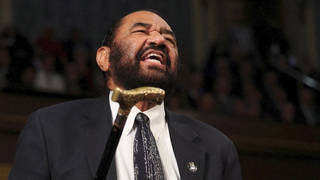
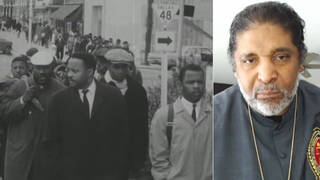
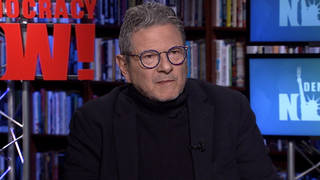
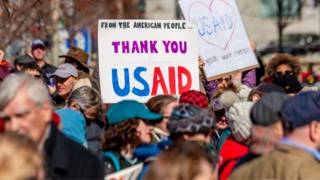





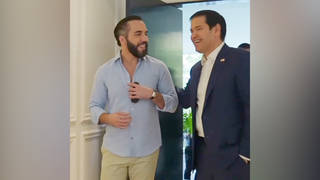
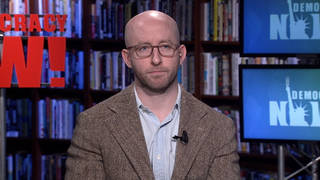
Media Options